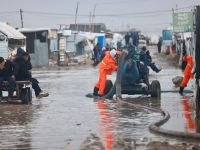Turkmen President Saparmurad Niyazov dealt a blow to Russia's plans to receive Turkmen natural gas Friday as the battle for control over Central Asia's resources took an unexpected turn.
"We will sell gas to Russia but long-term agreements can lead to arguments ... so we will sell gas for a maximum term of two, three years," said Niyazov.
Niyazov's comments cast doubts over a preliminary agreement that Ashkhabad would supply Moscow with 50 billion cubic meters of gas annually over the next 30 years.
The deal was struck during a visit by Russian President Vladimir Putin to this Central Asian state, although the two countries failed to agree a price.
Niyazov's statement came after the announcement by the international pipeline consortium, PSG, that it was closing its offices in Ashkhabad due to uncertainty over its Trans-Caspian link project.
The Trans-Caspian route to take gas from Turkmenistan to Turkey at a cost of two billion dollars has been heavily backed by the United States as a way of lessening Turkmenistan's dependence on Iran and Russia.
The withdrawal appeared to play into the hands of Russia, which is competing for supplies of Turkmen gas as part of its bid to boost its influence in the resource-rich region.
But Niyazov said Friday that he had not given up on the Trans-Caspian project.
"Let them provide political guarantees, let them provide ecological guarantees and let them make a pre-payment," he said as conditions for the renewal of the project consortium's mandate.
"We have not refused any project. Whatever project is beneficial for us we will continue. All the projects are still alive," said Niyazov.
He also expressed hope for two potential projects which have long appeared stalled. The best route for Turkmenistan's gas was through Iran, said Niyazov, although the United States has effectively blocked this route by imposing economic sanctions on that country.
He also suggested bringing back on line a gas pipeline through Afghanistan to Pakistan, which has long been dormant due to the ongoing civil war in Afghanistan.—AFP.
©--Agence France Presse.
© 2000 Mena Report (www.menareport.com)







